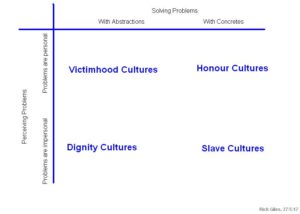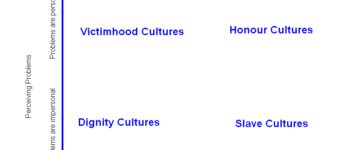Moral Cultures
March 2, 2019
By AHNZ
One of our major history tools, our mental furniture, our workshop toolbox standard instruments is the framework of Moral Cultures.
I realise I keep referring to Moral Culture in these posts so there ought to be a page or even a video to explain what all of this is about. Until then, here’s a very quick run-down.
Microaggression and Moral Cultures by Campbell and Manning (2014) was the basis for the way I look at Moral Culture. You can read this paper online as well as their book. In my opinion the best bits are actually owed to Leung and Cohen (2011). I’ve deepened the 3 Moral Cultures they identify and derived them from first principles which also generated a fourth Moral Culture they did not identify: Slave Culture. My other insight is that the mainstream culture in any given time period cycles through these 4 cultures, one after another, over and over.
The Four Cultures Are…
Perceive problems as personal and solve them personally. Hands on. Warrior culture. Constant concern for their reputation and place in the social hierarchy. Superstitious and paranoid. Eg. Pre-Discovery Maori and pre-Colonial Europeans such as the whaling settlements
- Dignity Culture
Perceive problems as impersonal: sticks and stones can break my bones but names can never hurt me. What would provoke an HC to a fist fight a DC will brush off but when he does fight it’s with institutions such as legal litigation. Scientific, logical, technological, builder of civilisations. Eg. Peak British Empire, Apirana Ngata, Ernest Rutherford
Perceive problems personally and get just as anxious and enraged as an HC yet their outlet and recourse is to institutions just as a DC would but with different motivations. The VC has a sensitivity to microaggressions that only an HC can appreciate. Wants to join every group they can and then ‘reform’ them into Safe Spaces that are Politically Correct and Diverse. No matter how many concessions DC give them it is never enough. Wealthy themselves, they depend on SC being downtrodden in order to have something to champion. Eg. C21st Social Justice Warriors, Feminists, Politicians, Treaty Grievance Negotiators
Perceive life’s problems as impersonal: They are resigned to misfortune and poverty as a matter of course to which they are passive and unable to affect. Good fortune, then, is luck so they buy lottery tickets and don’t work hard. If institutions do grant them rights or resources it’s seen only as luck rather than their due so they leave VC people to rescue them; It’s a partnership but the endless appetite of SC will eventually exhaust VC. An SC solves problems by signalling distress so they can be rescued or so others will stay away from them; Eg by making themselves smelly and untidy, by not owning nice things anyone would want to steal. Eg. Pre-Colonial low-caste Maoris, Post-Colonial Maoris, Parihaka/Ratana followers, welfare state wards, prison inmates.
There’s so much more to say and so many examples. The posts on AHNZ are the ongoing process of mapping this out and validating it. This basic 2D view on New Zealand history has good and bad points but in the end it’s best to have tools like this to structure our thinking than not. We will always have schema and perspectives when we look at the historical material so best of all is to use one, or more, that we know and accept and to use it consistently. That’s why Moral Cultures are a great tool for blowing the mystery of history wide open.
—
Ref. Derivation of Moral Cultures
Ref. Personality Cultures; NZB3
 Like Comment Share
Like Comment Share






